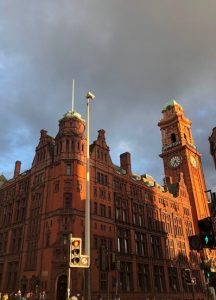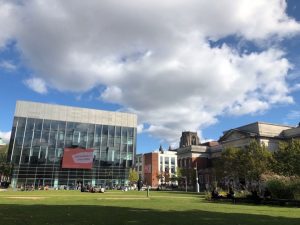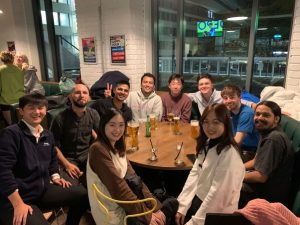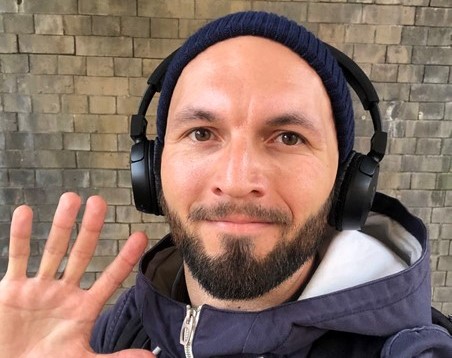by Ostap Fedyshyn, MSc Geographical Information Science
 I chose Manchester for multiple reasons. First, I needed to make sure that I could legally stay in the country for at least a year to gain some real-world work experience after graduation. Currently, the UK provides an opportunity to apply for a two-year graduate route visa, which suits me well. Next, I did not want to study in a small town. Manchester is arguably the second-largest city in the UK, it is well known globally, and it is a pleasant place to live in. The city has a vibrant cultural life and numerous job opportunities. Third, the University of Manchester was among the top ten best performing universities in the country, so I could be sure it was a serious institution. Finally, the university offered a very practical and job-oriented course, which suited my needs well.
I chose Manchester for multiple reasons. First, I needed to make sure that I could legally stay in the country for at least a year to gain some real-world work experience after graduation. Currently, the UK provides an opportunity to apply for a two-year graduate route visa, which suits me well. Next, I did not want to study in a small town. Manchester is arguably the second-largest city in the UK, it is well known globally, and it is a pleasant place to live in. The city has a vibrant cultural life and numerous job opportunities. Third, the University of Manchester was among the top ten best performing universities in the country, so I could be sure it was a serious institution. Finally, the university offered a very practical and job-oriented course, which suited my needs well.
The application process for me was pretty straightforward. I started to search for master’s courses relatively late, around November. I identified a couple of universities with courses that interested me and began preparing for the Test of English as a Foreign Language (TOEFL). As a foreigner, I had to take the test, which I did before the New Year. I had my results ready in early January, and I applied in the middle of the same month. I would suggest taking TOEFL (or other English language qualification) in late November, though, as you’d have more time to retake the test in case your results aren’t satisfactory.
Another thing that I did before applying, was to find the email addresses of course coordinators and send them a message explaining my situation and my desires for the course. You’d be surprised, but people from nearly every programme I applied to responded to me. Chatting with them is a great way to understand whether the programme is suitable for you or not.
I have also contacted a couple of professors from my earlier studies and some employers early on. I asked them for recommendations. I think it is essential to do this earlier as these people are usually quite busy, and it might take them a couple of days to reply. Patience is the key, and politeness is also very important. Also, whether you are finishing your bachelor’s or working, make sure you save the contacts of the people who might write you the recommendations.
In my case, the beginning of the course was quite chaotic because I had to quarantine for ten days (it was in the days of the late COVID), and because of that, I skipped the first week of my studies. The programme coordinators said that the first two weeks are not crucial and it’s okay not to append them; however, I highly recommend showing up to all the introductory lectures as that would give you a much better idea of what is your course about and how you should plan your time. This will also help you make some new friends, making your future studies easier and more enjoyable.

Another thing worth mentioning is accommodation. It’s a ‘biggie’ in Manchester, and I suggest spending some time searching for something in advance in July-August. If you are looking for a place outside the campus, I highly recommend being in the city for that, as good accommodation options usually are taken fast in September.
My overall experience here in Manchester is great. The course I took matches my expectations; I had an option to take many modules that involve programming and other highly applicable practical skills, which will make me more employable. The University of Manchester is a very exciting place to be in. I am sure you will always find something interesting to occupy yourself with, whether it is studies or entertainment. Good luck!


